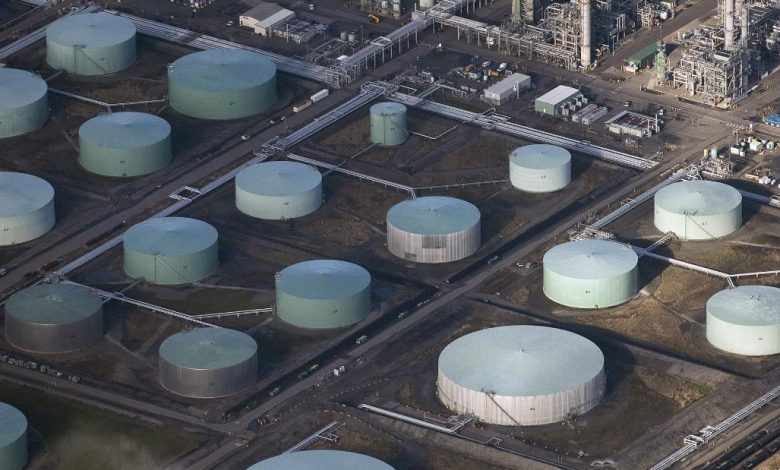Why Biden’s drive to lower gas prices is more Band-Aid than a game

The United States alone is releasing 50 million barrels of oil from the Strategic Petroleum Reserve. This is the largest release on record and an impressive way for the Biden administration to show that it is taking positive action in response to soaring pump prices.
The good news is that the mere rumor of this historic intervention has pushed oil prices down from a seven-year high. And that should provide some relief for Americans struggling with high gas prices.
But the bad news is that no one – not even the White House – is expecting a significant drop in pump prices.
According to Bob McNally, president of Rapidan Energy Group, the “best case” is for prices to drop by 15 to 20 cents a gallon.
And don’t expect it to happen right away.
“It’s not going to come fast and furious,” said Robert Yawger, vice president of energy futures at Mizuho Securities.
President Joe Biden acknowledged many of the same things in his announcement Tuesday.
“While our combined actions won’t solve the problem of high gas prices overnight, it will make a difference,” Biden said. “It’s going to take time, but before long, you should see where the price of gas drops and you fill up your tank.”
The key details of the international intervention are still unclear, including the exact amount that the major powers are contributing. The White House initially announced that China would participate, but then Biden said only that China “could do more.”
The lack of details may not impress Wall Street. After initially pulling back on the news, US oil prices ended the trading day 2.2% higher. Brent crude, the world benchmark, gained more than 3%.
Unless China is ramping up the release of a large number of barrels, this concerted effort is likely to be more of a support measure than a game changer.
The world consumes 100 million barrels per day
The problem is that the SPR won’t solve the fundamental problem: Oil supply can’t keep up with rising demand as the US economy recovers from Covid. While the release of barrels from strategic reserves can help, there is a finite amount of oil in reserve. Countries can’t just release oil every month.
“The release of oil from the SPR stockpile is not going to have a lasting effect on bringing down gasoline prices,” said Rob Thummel, portfolio manager at Tortoise, an energy investment firm.
Advocates of the use of SPR acknowledge this point.
“It’s not going to be a panacea. But we have to do what we can,” Democratic Representative Ro Khanna of California told CNN Monday after sending Biden a letter of appeal. he exploits SPR.
It is important to keep the size of the actions in the context. While the US release of 50 million barrels is the largest in US history, that’s roughly what the world consumes every 12 hours.
Kick in the can
Another factor is how the Biden administration releases the oil barrels.
Around 18 million barrels will be the driving force behind the sale that Congress previously authorized.
The rest, 32 million barrels, will be released through an exchange or swap. By definition, those crates have to be returned at a later date, and that supply has to come from somewhere.
“The market knows that the barrels have to be returned. To a certain extent, that’s self-defeating,” Mizuho’s Yawger said.
Rystad Energy senior oil market analyst Louise Dickson agrees.
“The move by Biden and other leaders may only push the supply issue down the timeline,” Dickson wrote in a note Tuesday, “as stockpile depletion will put further strain on the supply chain.” with their already low oil stockpiles and these countries will eventually have to continue buying to replenish their strategic reserves. “
However, Biden officials note that the futures market is signaling lower prices next year. As such, they see the move as a “bridge from the current high price environment to the future lower price environment.”
Outlook for 2022
Despite all of this, Biden officials feel compelled to act, in large part because high gas prices and inflation in general are creating anxiety for millions of Americans. And that anxiety is weighing on Biden’s poll numbers.
Biden is “as empathetic as anyone I’ve ever worked with,” a senior administration official told reporters at a news conference. “Consumers are facing pump challenges right now. And we’re trying to deal with that situation and address it in a smart, relevant and positive way.”
Tom Kloza, head of the Oil Price Information Service, said the coordinated release was more than just a measure of support and argued that “we could have knocked on the door $90” had it not been for the release. SPR.
However, Kloza is concerned that gas prices will rise sharply in early 2022, outpacing oil prices as refineries in California, New Mexico and Louisiana shut down.
“They won’t be back, and we’ll miss them,” Kloza said. “We’re going to have a real apocalyptic spring, in my view. And it’s not about Joe Biden.”
‘Nuclear option’
There are two main wildcards in the future.
First, the White House signaled Biden might not be done yet.
“The President stands ready to take additional action, if necessary, and is prepared to use his discretion in coordination with the rest of the world to maintain adequate supplies as we emerge from the pandemic,” the White House said. in the fact sheet.
But the bigger question is how OPEC and its allies, collectively known as OPEC+, respond.
The group, led by Russia and Saudi Arabia, is expected to meet next week, and the plan is to increase production by 400,000 barrels per day. However, it’s easy to see how these manufacturers scrap those plans. OPEC+ could easily cite emergency releases or the Covid shutdown in Austria as the reason why those barrels are no longer needed.
“That would be the nuclear option,” said Helima Croft, global head of commodity strategy at RBC Capital Markets.
.




